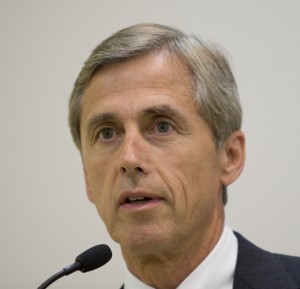[Update 5 – 10/17/09 – another validation of my analysis – Bergen Record: Gubernatorial contenders strike a civil tone
[Update 4 – validating my point, chalk this up to Daggett’s leadership: Gov. Corzine would consider gasoline tax increase for transportation projects
[Update 3 – 10/11/09: NY Times echoes my point: Independent Candidate Stirs Up the Governor’s Race in New Jersey “Mr. Daggett’s dry talk of substance has filled an enormous vacuum.”
[Update 2 – 10/10/09: Star-Ledger endorses independent Chris Daggett for N.J. governor
[Update 1 : Some have misunderstood this post to mean that I support Daggett. That was not the intent of the post. For the record, I take no position on Daggett. I have written mostly favorably of his energy policy proposals here, written mostly critically of his ethics, DEP, and environmental policy initiatives here, and strongly criticized the Sierra Club for how they handled the Daggett endorsement here.]
Chris Daggettt has already won. It doesn’t matter now who gets elected.

Chris Daggett, Independent candidate for NJ Governor
Daggett has managed to change not only the tone and tenor of this year’s campaign, but has created space for real governing after the election.
Just like the upcoming October 8 debate will dramatically change from the previous one, so too will governing in Trenton in the lame duck session as well as by the next Governor.
Daggett did so the old fashioned way, by injecting policy back into politics and by focusing on governing, not just campaigning.
In the process, he has far outdone Obama, while creating a policy opportunity far greater than the President, who championed the empty slogan of “change” in the Presidential campaign and has since governed without a progressive policy framework.
Daggett’s feat has illustrated that campaigning and governing are inextricably linked.
Whether a campaign is based on fear and smear (the Republican and Christie model) or empty rhetoric (the Democratic and Corzine model) does not matter. Both styles do not enable the framing of issues or formation of consensus to emerge on policy. Without a policy framework or consensus, it is impossible to govern effectively.
Thank goodness that this is now obvious. And the result does not inure to the benefit of an individual candidate, but determines the entire context for the remainder of the campaign and the next administration. This is a huge feat.
Daggett accomplished his feat by framing 4 progressive public policy fields and by finally vanquishing the anti-government bogeyman that has brought NJ to this crisis point:
1. The need for investments in infrastructure. Daggett has put the long forgotten Transportation Trust back on the radar screen. He has done so by focusing on transportation needs and stable financing. He has done so in a way that does not play into anti-tax and anti-toll sentiment, or rely on privatization or financial schemes, as Corzine did.
2. The need to change the tax structure. Daggett not only has opened up an important policy discussion on shifting the tax structure to better fit our service economy. He openly pledged to consider raising the gas tax (an issue previously off the table). When combined with Daggett’s environmental policy views, this opens the door for and will naturally lead to considering a broader based energy or consumption tax framework. Critically, an energy or carbon based tax (with low/moderate income rebate) can level the economic playing field between renewable energy costs and subsidized carbon based fuels, and spur private investment in renewable energy. So again, Daggett has won by brilliantly and creatively linking tax policy, the structure of the economy, and substantive policy goals.
3. The need to make protecting the environment a priority. Daggett has illustrated the need to link rhetorical policy goals with implementation. His move to hold a press conference and take clear positions on specific energy projects (off shore LNG, Linden coal plant, et al) immediately after the September 8 energy debate was a clear demonstration of this. By doing so, without even mentioning or criticizing them, Daggett showed why Corzine’s empty energy and global warming goals are so flawed. Daggett was also the only candidate to even mention the environment in the first debate, and he did this in a way that linked his tax restructuring with investments in open space. Again, a brilliant policy and rhetorical move.
4. The need to stem the”brain drain” and invest in education. Daggett is the only candidate even talking about this critical issue. Lots of voters intuitively understand this, because they went to college or their kids are going to college in another state. NJ’s higher education is a national disgrace.
Last, Daggett was called a “dreamer” and ineffective candidate and politician by columnist Tom Moran of the Star Ledger. Moran has things exactly backwards. By leadership and what a buffoon of a president called “the vision thing”, Dagger has opened vast new space for policy and governing.
Daggett is the only effective politician in the race (whether he wins or loses).
Now if the media would only get with the program….

Pingback: WolfeNotes.com » Year of Rollback, Retreat, and Appeasement – Christie Worse Than Whitman 1994